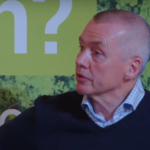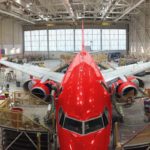Aviation executives took to the stage at the World Aviation Festival to share their insights on the challenges they have faced in recent years, the lessons they have learned and their recommendations and predictions for future growth.
KLM CEO, Marjan Rintel, spoke of the industry’s recovery from the impact from the pandemic, but said that it shouldn’t go back to the old normal.
Sustainability
She highlighted KLM’s commitment to use and develop sustainable aviation fuel (SAF), and the value and power of collaboration and knowledge sharing to make the new exceptional possible for the industry.
Asked how it was possible to build an airline with capacity constraints in place, she said it was disappointing those constraints were taking so long to resolve and pressed for them to be removed.
In overcoming labour issues, she stressed the need to make jobs more attractive, and highlighted that KLM had hired several hundred people so it could be done.
She reaffirmed her belief in KLM’s hub and spoke model at Schiphol and, when asked about SAF, stressed the need to speed up production as there are insufficient supplies and SAF is too expensive.
Schiphol Airport problems
Schiphol Airport’s President and CEO, Dick Benschop, spoke of the huge impact Covid has had on airlines and airports, including the challenges Schiphol has faced since May.
He acknowledged staff shortages, particularly in security, and said that action plans were in place, while also referencing the limits across the wider labour market as a whole. He also highlighted that in the latest Eurocontrol review, Schiphol was the second busiest airport in Europe (after Istanbul).
In his keynote interview, IATA Director General Willie Walsh said he remained very optimistic about the industry, stating that the fact that it had come through the pandemic, and the measures it had taken to survive, demonstrated its resilience.
Asked whether there were lessons to be learned from the past year, he said the industry didn’t anticipate the timeframes required for getting clearance for security personnel, and acknowledged the challenge of attracting people back to an industry that was encountering major challenges.
He said the industry was set for annual global growth of around 3-4 per cent, with continued growth in Europe, and significant growth in Asia, with the exception of China where the domestic market is huge but international growth is slower.
Covid challenges
Qantas CEO Alan Joyce said that he’d faced bigger challenges than Covid-19, but acknowledged that the situation is now is a lot better than two years ago, with revenue levels returning and the airline almost back to normal from an operational perspective.
Stating that Covid hadn’t disappeared altogether, he said the airline was cautious about adding back all of its previous capacity, and that that it would keep people and aircraft in reserve to meet operational challenges.
In a keynote interview, SAS President and CEO, Anko Van Der Werff, stressed the need to take tough decisions. He outlined how the Chapter 11 restructuring process the airline is currently undergoing is enabling it to renegotiate costs, and become a healthier airline.
He used the example of the impact of the Russian airspace closure on its operations, and how Chapter 11 was enabling it to negotiate with lessors about returning widebody aircraft.
He stated that the long-term trend for SAS was towards leisure being the more important market. Asked if lower growth rates in the current environment would encourage consolidation, he observed that airline start-ups were happening, and yet some of these carriers operating in mature markets were already putting employees on furlough.
Working more closely together
In a panel on partnerships, technology adoption and business models, the CEOs of Austrian Airlines, SAS, ITA Airways, highlighted the need for the industry to work more closely together, and for airlines to share the benefits as well as the pain points of the industry.
Fabio Lazzerini from ITA Airways highlighted the benefits of integrating different transport systems. When it came to developing technology solutions, and whether this should be done at individual airline level, he said that SkyTeam had used a significant part of its budget to develop technology for use by its member airlines.
Anko Van Der Werff from SAS spoke of the challenges airlines faced from being very early technology innovators with systems such as GDS and how, as an industry, they needed to be working towards new shared solutions.
Annette Mann from Austrian Airlines talked about shared competencies across the Lufthansa Group such as sales and digitalisation, and the seamless travel experience this was helping to create.
She also stressed that, in the development of more sustainable travel options, the industry needed to create product ideas to make areas such as SAF more tangible to consumers.
Subscribe to the FINN weekly newsletter

